
I I I ,
C H R O N I C E
S I X T Y - O N E
T H E
T I G E R
O F
H A G I ,
A N N O
S T E L L A E

In the forests of the night,
what immortal hand or eye
Could frame thy fearful symmetry?
In what distant deeps or skies
Burnt the fire of thine eyes?
On what wings dare he aspire?
What the hand dare seize the fire?...
When the stars threw down their spears
And water'd heaven with their tears,
Did he smile his work to see?
Did he who made the Lamb make thee?
(William Blake, Visionary Poet of England, 1774)
A client, subsidiary ally of the Atlanteans, the star system of Nergulia holds fast to its ancient way of life on not very appealing planets. These mostly barren and ugly as sin hunks of lichen-crusted volcanic igneous rocks slowly and depressingly circled some rather faint and cold stars. Sheer hardship coupled with survival of the fittest, both in the extensive caves and on the surface, created the first truly dog-eat-dog society (though there were no canine species in all Nergulia).
Even the Twin Earths could not qualify as dog-eat-dog--as there were always just too many people aboard who sincerely cared about the welfare of other people, and even loved them enough not to want to eat them or harm others in any way. For that reason they could never truly produce a society such as Nergulia's (even though there would arise, from time to time, the most ruthless, absolutist, and bloody societies in various localities, with the conscienceless thugs to lead them). Sometimes it looked as if Nergulia's way of life might engulf the two planets, but always Nergulian-type empires were pushed back and defeated, at tremendous cost, by those who hated totalitarianism and preferred freedom enough to fight and die for it if necessary.
With no such restraint, almost utterly left alone in its hermit state, Nergulia developed an absolutist world system that no one within it could possibly overthrow, much less question. Based on cannibalism and the strong dominating the weak and actually consuming the weak as staple food, Nergulia built up an iron-fisted warrior class that the Atlanteans found most useful on several occasions when intense, protracted power struggles in their midst required an infusion of mercenaries to support this or that contender for the throne.
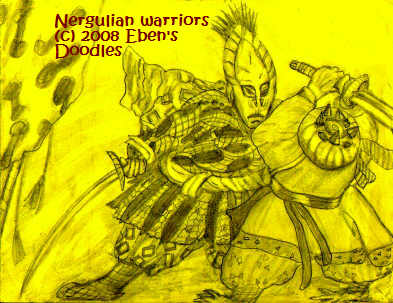
In exchange for their services as guards and harvesters of human blood donors, the Nergulians received technology, and were able to advance their civilization to technological levels they might not have reached otherwise, because their hard scrabble existence did not encourage or even permit costly improvements.
Star travel was one chief reward, which allowed them access to more productive worlds (to them, any planet that was not frozen solid or a flaming ball of gas was "productive" or inhabitable), where they could find supplies of metals, minerals, plants, and foodstuffs that Nergulia lacked (and always would lack).
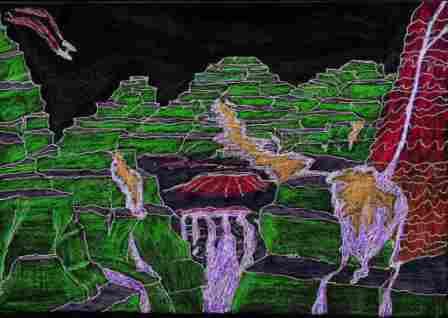
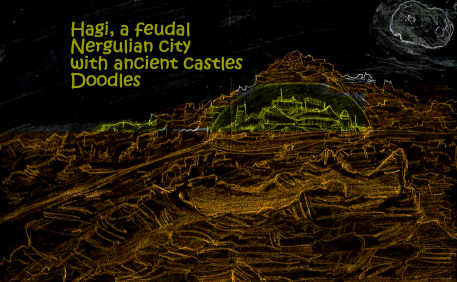
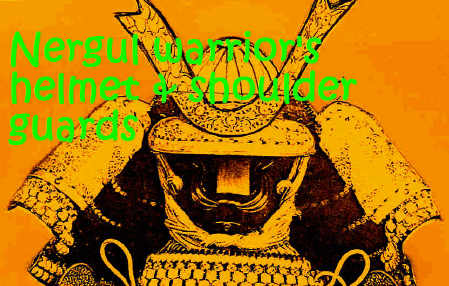
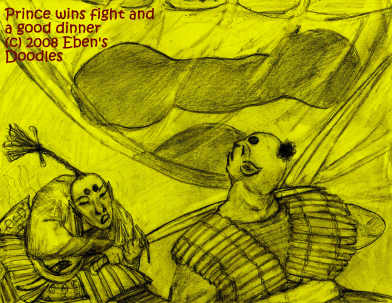
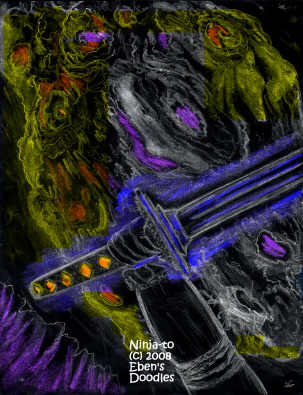
Looking at him, there was no clew he was different, or that he was doing his own thinking (a very dangerous development in ancestor-worshipping, past-revering Nergulia). He looked like an exact copy of his honorable deceased father (revered but eventually eaten at a grand state banquet, after a period of proper mourning and preservation in ice to age the sacred remains to achieve the optimum flavor). High caste members such as his father were special delicacies, awarded only to the highest echelons of society.
Though he was not allowed to consume any part of his father (since he was in the period of filial mourning, which for the sake of limiting assassination prescribed a ten-year fast for the heir and eldest son from eating deceased family members), he was allowed to wear his father's bones in his hair ornaments. Somehow they did not achieve the desired effect, as a father's bones were supposed to do, though he wore them dutifully day and night. Somehow his father had not transmitted his Darwinian legacy to the eldest son, and this stray mutant gene had slipped in. Random or not, it was not going to fit the Nergulian system and way of life--as events proved out.
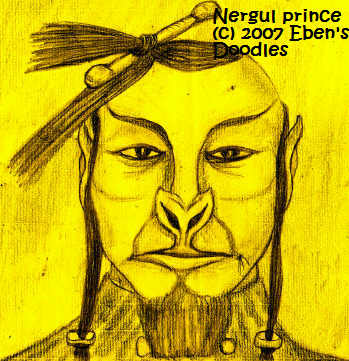
Thinking individually was a dangerous behavior in Nergulia. Any suspicion of such a thing almost immediately produced a brutal, swift action: the aberration and the person exhibiting it was utterly crushed, swept out of existence. A prince, however, was given a certain latitude--he was not above the rules and laws, but he was not going to be scrutinized so severely every minute of the day as the slaves were. After all, a prince had the most to lose if the system crumbled and the slaves (who formed the base of the Nergulian food chain) got out of hand by thinking more highly of themselves than they ought to think.
This latitude reserved only for the highest echelons of the princely warrior class created just enough room for the aberrant gene to develop its potential. But the mutating prince came to a place where he did not need the gene--he found he could think for himself by simple practice, by concentrating hard enough on his chosen lines of thought. It meant almost turning inside out, for a Nergulian formed and indoctrinated since birth in absolute, draconian Nergulian principles and the supreme, ineluctable, unchangeable dog-eat-dog order of the Universe as defined by Nergulian (and Darwinian) socialization. On the exterior, he showed no change, he looked just the way a Nergulian prince should look and always looked. But inside he was a seething mass of conflicting, ingenious, creative, really novel and exciting and new possibilities and potentials that were pressing harder and harder agsinst the millenial-old restraints built into him by Nergulian class and martial arts training.
Spoken like true shishi [disciples]! But that was madness, of course! Tamemoto knew they would all be executed, if they disobeyd the summons of military service. The starship came to pick the tengu-shishi warriors up, and there was no excuse for not going. To refuse military service was suicide, but hardly an honorable one.
Tamemoto surprised them by going to the ship with them. "I will go with you," he told them. Astonished, they could not find words, and there was no speaking about it anyway--as they would be overheard and questioned, with beatings.
As a high-born prince, born of the renowned Mori line, Tamemoto could not be refused passage, but that did not mean he would be free to come and go aboard, or to interfere with his retainers now that they were serving a military commander.
If there came some opportunity, perhaps he could go and speak to them--but this privilege might be resented, and the men beaten.
Knowing this, the tengu assured him, "We will gladly take their beatings, if you will come and teach us as before! You must come!"
What was Tamemoto to do? His heart was knit inextricably to his tengu warriors' hearts!
How the ship sickened him, however. He was not used to the military life that was the usual thing aboard a naval starship--how brutal, uncivilized, and dirty the conditions were! His tengu scholars suffered the same as the others--but it deeply pained Tamemoto's heart to see them subjected to filth and barbarity.
But there were worse things aboard than the grime and the uncouth, boorish officers and navymen. He almost lost control of himself when he saw a slave boy being interred alive in a box. It should not have disturbed him, since it was a time-honored custom aboard ship.
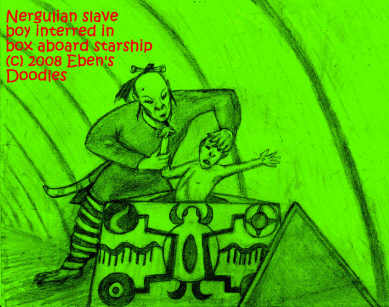
Holding himself back from stopping this outrage, Tamemoto's princely blue blood boiled in his veins as he was forced to watch the desperate, terrified boy being pushed down into the box and the lid clamped onto it. Slowly, the boy was asphyxiated, and his cries grew weaker and weaker. Tamemoto went to his cabin, and remained there, seated on the floor not moving for a long time and taking no food or water. While there alone, he determined that the evil of this practice must end--but how? He could not do it alone. Who would help him end this evil? Surely, his tengu, his shishi! True disciples, they would fight to the death for him, at a single word from their sensei--he knew. But he could not ask that of them--would that change anything? The same practice went on in every starship, every time one went out!
What was he to do? Overthrow the entire society of Nergul for the sake of slave boys? Under law they had no right to life--and could be killed for any reason by their superiors. They were nonentities, chattel and property at best, but of very low value, even below that of an earthenware piss pot.
The ship's mission,to launch a probe before escorting a major force of the Algol who were emigrating to a new home, a mostly blue, watery planet called Earth, had to be completed before the ship could turn around and transport the prince home along with his kempaku.
Toshi Hirobumi, one of Tora Tora's disciples, one day picked up the kempaku from the prince's writing desk, first bowing low as he did so. "Allow me, revered Master, to deliver this personally to the emperor!"
"Who told you it was addressed to the emperor?" the startled prince burst out. "Did you open it without my leave?"
"Not so, Master," the disciple declared, a look of horror on his face. "When you were resting and I was standing guard, I heard you speaking in your sleep, as if to the emperor, saying you had a letter waiting for him. I thought this must be it, as it is left in its case."
Prince Tamemoto tried not to smile, but his eyes might betray him, so he turned his face away from the intense scrutiny of his disciple. "This is the first I heard of my speaking unadvisedly in my sleep. I must sleep with bed curtains drawn from now on and post no guards! But what of it? I will not authorize you to deliver the kempaku, for it is too..."
Before he finished his thought, he heard a movement behind him, and turned just in time to see his disciple leap out the window, then jump from the balcony to the ground. The prince ran to the window and saw the disciple racing up the walled, defensive zig zag street, the kempaku in his hand. The prince sighed. It was no use trying to chase the young man down. That would be far too undignified for a sensei, and what would that serve if he did? He could not catch such a fleet-footed fellow as this disciple, who was the best runner in Hagi, as everyone well knew from the many contests he had won against all the other contenders. As for Tora Tora, he despised death, and would have gone himself and sacrificed his head, without a second thought, but being short of leg and wind and not good for distance running, he knew there was nothing left to do but wait for the emperor's response.
Toshi was making record time through the tortured, lava-layered hellscape between Hagi and the capital--a journey that took normal foot-traffic several days, but he covered it in less than a day, using his whip of obsidian points he carried to keep his legs running up to speed.
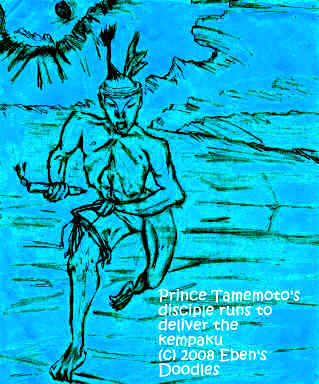
Tiger-yaks were cruel and cunning, but rather slow in their brains. Climbing the rocks instead, Toshi was too quick for the tiger-yak. He sent big boulders crashing down upon the yak, which was wounded in the rib cage by one of them. Taunting the tiger-yak, Toshi continued on his way, and back on the trail ahead of the bellowing monster, he started running again.
Of course, a wounded tiger-yak, with its fury up, is not going to let the prey get away if it still can run, and this one was no exception. Pursued, Toshi heard and saw in a glance that the tiger-yak was not giving up, though it was leaving a scarlet track behind it.
Throwing delighted taunts, Toshi laughed, and kept just ahead of the yak's snorting and snapping jaws, inflaming its anger all the more.
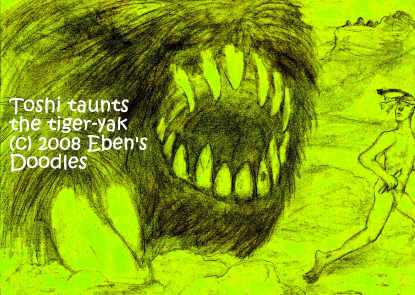
They rose from their hiding places and stood, cheering on Toshi, who shouted to them to follow and enjoy some fine feasting on the yak when he was through with his play.
So the thieves and cutthroats sprang up and followed the two rapidly disappearing figures.
The first rope bridge came into view, and Toshi did not hesitate. He led the monster to it and continued across, and the tiger-yak, infuriated as it was, did not think fast enough and consider what it was threading upon was not solid rock, it was so intent on catching its tormentor and devouring every little bit of him if it didn't first stamp him into the ground.
Toshi reached the opposite side, and grabbed the bridge guard's sword and hacked at the main lines of the bridge before the guard could stop him. The two ton weight of the on-coming tiger-yak did the rest, and the bridge collapsed, sending the monster to its rocky grave and leaving the bandits stranded on the other side of the chasm.
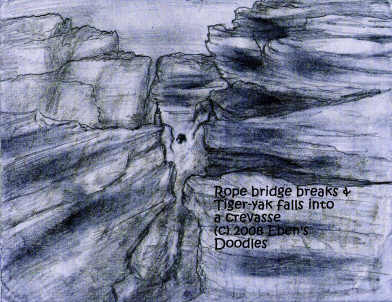
A door left ajar, or swinging, causes me no grief like this grief.
I am bereft of my obsidian-eyed shishi!
And whom shall see his like again?
Slow of mind will not.
Fleet of foot will not.
Both in foot and mind, he was better than them all.
I would bleed for any that sit at my feet to learn something they would choose to die to keep.
I would give my life for theirs.
But what would I give for yours?
The loss cannot be made up...
Prince Tamemoto, on a stone altar in his walled garden, was burning the classic waka he had inscribed and illustrated to the shining memory of Toshi his disciple even while the subject of it laid eyes on the domed palace of the Emperor. What he saw was an immense, ancient warren of sleeping chambers and walled gardens, grand halls of state, harems, dungeons, and armories, that was called The Forbidden City, where the Jewel reigned in silent majesty, closeted by the ever-watchful shogun.
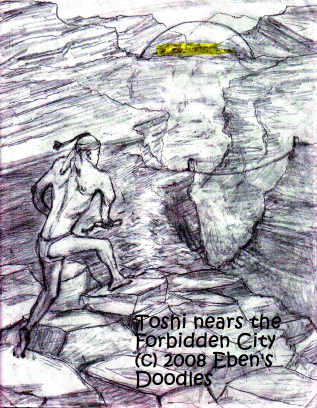
At the palace, Toshi had to climb up tall stairs to the main entrance alone.
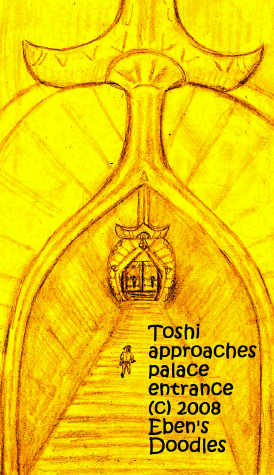
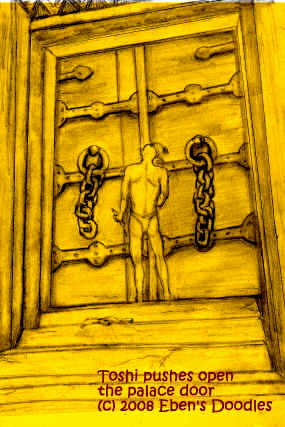
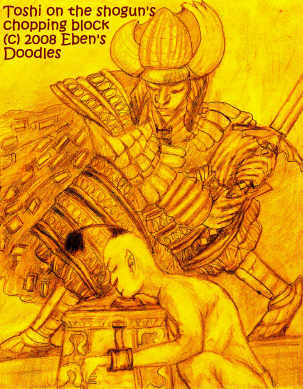
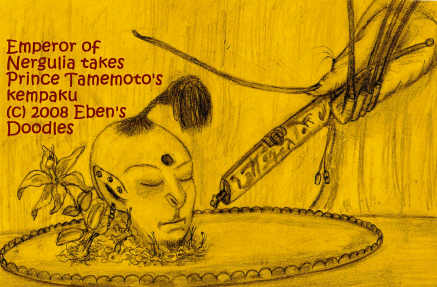
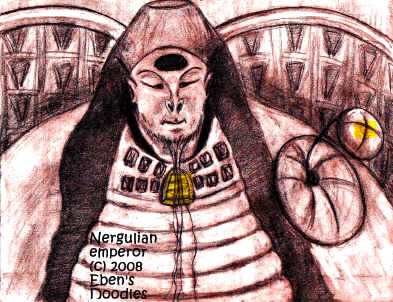
The emperor read the kempaku, the first of its kind he had ever seen, being composed in haikus, classic poetic lines of seventeen syllables each.
O Jewel of the Realm,
Eternal and shining alway,
Shine on me!
II
Thy Gleaming face
Suffers no darkness, but dispells
All shades of chill night.
III
So banish, O Nergul's Jem,
Most shameful boxes,
Whose lids disdain thy light!
He signed to the Imperial Mentor, who bowed and prostrated himself before the august presence.
"Read the kempaku of Prince Tamemoto! Then tell me the meaning! I must know what it means, so I know whether to reward or execute and eat him!"
Now the emperor held no power of state, not even a shred of power, and did not know it--for the usurping Tojogawa shogun, who sat on a pillow filled with fine powdered skull bone behind a golden screen in the emperor's audience hall, held all the power and made all the decisions of state. He alone signed and issued all the emperor's decrees without the emperor's knowledge or being involved in the least way.
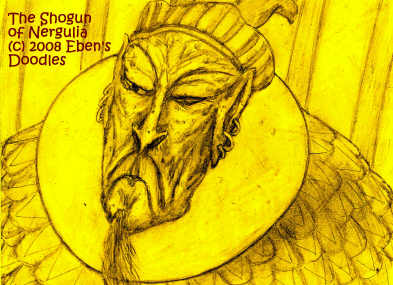
Trembling head to foot, the Mentor read the kempaku, every offensive and impudent line of it. Thinking he was a dead man, he wrote the explanation out dutifully, and lay it on the golden platter set before the emperor on his dais.
The emperor took the Mentor's writing and read it. When he got to the end of the three parts, which were succinct and to the point, the emperor's waxen, white features (for the emperors were given a facial of a white arsenic and tiger-yak butter compound to beautify them, and painted on eyebrows and outlined lips--though their lips were Nergulian, thus a very thin line) remained rigid. His eyes were also rigid in his mask like face, but then the whiteness began to crack, as the emperor's face contorted with rage.
Something totally unexpected happened, which no one, not even the shogun who had lived through three anemic boy emperors and two idiot adults so far, had ever witnessed in the imperial presence. The emperor rose to his feet despite the commoners present (even the shogun and the other nobility were commoners, compared with the emperor who stood in a class of his own).
The emperor continued standing, nevertheless, breaking and casting aside all the strings of precedent and tradition in doing so, and he pointed the index finger and its nail toward the screened shogun.
"You! I know you are there! I will not ask of fools, unless you are one too, and then you will die wretchedly, your nails torn out and your asp tongue wrenched from its roots, and--! Enough of that! What is the meaning of this kempaku, when it says, 'shameful boxes'?"
The shogun was astounded. "Shameful boxes"? It was merely a silly poet's flight of fancy! It meant nothing more than that! How could boxes be shameful? It was sheer nonsense to suppose there were such things in the realm, Your Celestial Majesty!
But how was he to tell the emperor this? He reached out from behind the screen, and pulled a palace guard to him, and the guard went crawling like a sightless cave worm to the golden platter, putting in the message the shogun hastily scribbled on a tablet.
The emperor read the explanation of the shogun, and grew even more outraged. He again addressed the shogun directly, though the screen kept the two from seeing each other.
"Fetch the impudent one called Prince Tamemoto to me immediately! He must explain his own kempaku. Surely he can do that! If not, he will be given to the abject slave women serving in the harem to tear apart and eat--that should be shame enough for him! I myself could not stomach him!"
The emperor, who was scheduled for a pedicure and manicure in his private chambers, then seated himself, and sat as if he would not leave the throne room and his dais until the kempaku's author was brought in.
The emperor was powerless, of course, but what was the shogun to do? This was an indelicate situation, to say the least, with an emperor sitting in state and refusing to budge! There was nothing for it. No precedent, no tradition, no protocol. Divine son of Da-Win, and some claimed Nergul too, in incestuous union, a god himself, how was one to inform him he had no power?
The shogun made hurried orders to the palace guards, and a contingent hurried off, riding out the palace gate on the swiftest carriages, each manned by slaves trained specially for long, high speed runs. In relays, a long distance could be quickly covered, though the exhausted relays, bleeding in their lungs or at the nostrils, often fell dead along the routes--their bodies later retrieved and used for food.
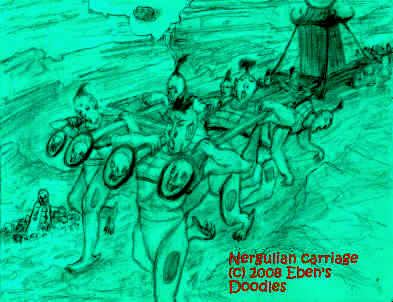
The emperor's shaved, hairline eyebrows raised, as no prince before had dared to walk into his presence like that. Was he going to bow, or not? The emperor could not hazard a guess, even while the observing shogun thought, "Good riddance to bad rubbish!", assuming that Prince Tamemoto was a dead man already.
Somehow the emperor was pleased, when the prince stood, offering him a low bow instead of the prescribed prostration of a slave, face and forehead to the floor.
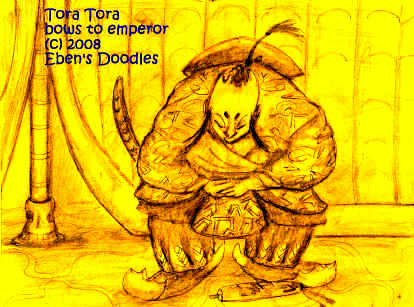
"Observe closely with your sacred eyes, Your Majesty, as I withdraw the lid. What you see is shameful, very shameful, is it not?"
Even more interested by this bold statement, the emperor waited, and watched the prince draw back the lid after prying it up with the tip of his Shadow Warrior sword.
Then setting down the lid along with his sword, the prince reached in with both hands and brought out something that appeared to the emperor at first to be a mangled, misshapen child's doll run over by a tiger-yak and chariot and left in the street.
Only gradually did the emperor realize it was a slave, a young boy. The hands were claws, rigid and red-nailed, the arms bent. But the eyes were most striking, he found. They were wide open, full of terror, though dead and sightless.
The prince set the boy back in the box, then lifted the lid so that the emperor could see the bloody scratches on its underside. "He tore off his own fingernails trying to get out," he explained to the emperor.
Of course, any wild animal, caged, would do something like that. Yet the look in the dead boy's eyes--it struck a chord of some kind in the emperor. He grew very stiff and pale, and tried to rise up, but his knees gave out and he collapsed back on his cushions.
He tried to speak to the prince, but nothing came out of his painted mouth but awful rasping noises.
Finally, a voice emerged from the emperor's throat. He sounded like he was being strangled with a bowstring, it was so difficult getting his words out. "Why, that is what is done to me! All my life, shut in a dark, shameful box of this very same kind--I--I--am not dead!--I refuse this living, gilded death arranged for me!"
He rose again, his pale, lacquer-nailed fists clenched, and the golden screen that shielded the Tojogawa shogun and the emperor from each other's gaze crashed down. The shogun had bolted, right over it!
The royal audience hall erupted. Guards dashed about, some following the shogun fleeing out the entrance, while others started toward the emperor as if he needed help or defense.
The prince, however, who stood at the center of this unparalleled brouhaha in Nergul, smiled thinly, then walked out of the audience hall with firm, measured steps.
Nobody prevented him, and he left the palace and went home to Hagi, back to his scroll-filled private study, where he resumed his work on his notebooks.
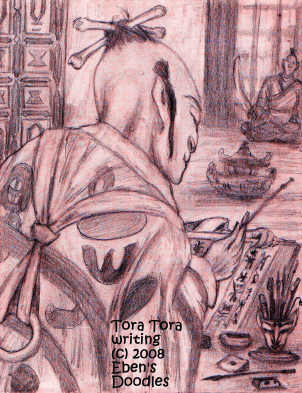
Amazing things happened, continued to happen, despite his scholarly pursuits and teaching schedule at his discipleship and wisdom school, the Shoka Sonjuku, or Private Academy Under the Pine Lichens. The prince was the epicenter of epochal change, and Nergulia was soon apprized of that fact when yet another throne-shaking kempaku followed the first, delivered straight to the emperor. After all, no one should have been surprised by one named Tora Tora--Tiger Tiger--when he began showing his tigerhood and threatened to tear the whole system of Nergul apart with his slashing claws and razor-edged teeth, starting at the very top.
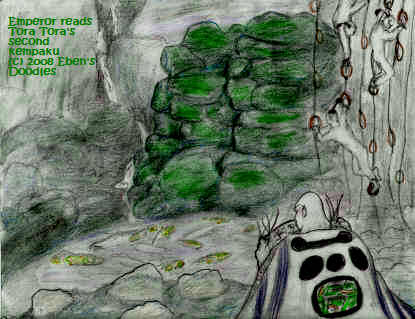
We kill and eat,
Then are killed and eaten.
Is this our life?
Nay, 'tis death.
II
Why is one man a cringing slave,
Another man his strutting master?
What jailor gods chained us?
III
Marching lockstep into the darkness,
Changeless, perfect,
Is our box of shame.
Reaching his royal chambers, the emperor laid outstretched on his gilded and jeweled tatami mat, prostrated by the thundering truth and enlightenment shining forth from the kempaku.
Since the city's population was more valuable taken alive and desirable for eating, no starships were called in to destroy the city and blast its inhabitants into flaming dust clouds. The first attack was crushed without much damage to Hagi, as the zig zag defensive streets were ideal for ambushing the enemy troops while confusing them with their labyrinthian pattern. Hagians since childhood spent playing in the streets had no trouble finding their way, but strangers got hopelessly lost in them, and this put the advantage squarely with the Mori clan warriors.
With much loss of faith, the Tojogawa commander retreated with the remnants of his forces, which had been superior, originally, in numbers compared with the numbers the Mori of Hagi could produce.
Tora Tora knew that the cessation of hostilities did not mean the Tojogawas had given up their revolt against the emperor--though they did not call themselves rebels, preferring "restorers of the imperial power," which the prince knew was a brazen lie to deceive their own followers and mislead the Nergulian people. They were only biding time and strengthening themselves for the final assault on Hagi. In the meantime, Tora Tora went and visited the Temple of a Thousand Blood Bowls, which was Da-Win's principle shrine, located in a cave near Hagi.
Since this was not a martial visit or act of war, he took only a few disciples, intending to hold a class for the benefit of the priests at the shrine, thinking to introduce new and enlightened ideas to them in a way they could understand. He felt sure that if they could hear his collected thoughts about the inequity of taking the life blood of slaves rather than their own (which they could piously volunteer, if the god truly required such a thing as blood), they would change their ways, and do it without force applied to them by the Mori clan warriors. After all, the shrine was based on the sacrifice of slaves and the drawing of their blood for the god--and this terrible practice had to stop. Let those who wished volunteer their blood to the god--but blood must not be extracted forcibly, by slitting the throats of slaves on the sacrifice stone and draining the blood into collecting bowls for presentation to Da-Win and his attendant bats.
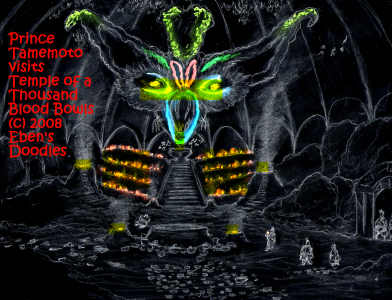
It was then he understood, the priests thought he was coming to put them all to death, and so they had fled at the news of his approach. Obviously, they had an informant in Hagi, and he had alerted the priests. This hurt the prince. How could someone in his own natal city misinterpret his teachings so badly as to frighten the priests, whom he knew to be only traditional men, darkened with the rituals and blind ceremonies of a cruel god so as to accept untrue things attributed to the gods. His latest kempaku to the emperor had dealt, in fact, with the religion of the Bat Divinities, Da-win and Ner-gul, exposing the tale of their bloodthirsty natures as contrary to reason, ethical order, and the sanctity of life. Gods should not demand the sacrifice and the blood of slaves. What kind of gods were those? Surely, the will of the gods and their nature had been misunderstood! Such gods as Nergulia served were not worthy of worship if they were the type that the priests had believed them to be.
With the priests fled to castle and court of the Tojogawas--for where else would they run?-- Tora Tora's chance to teach them enlightenment and liberty was lost for the time being. He did not bother to look in at the shrine of Ner-gul, which lay nearby, and returned sadly to Hagi.
As the tiger-prince made his way back to Hagi with his retainers, he had time to reflect on the troubling reaction of the priests to the news of his coming. Was he such a monster to them? he wondered. He had only intended to do them good, he knew, but they assumed he would fall upon them and slay them. Why? Had he made any critical remarks against the high gods of Nergulia? He did not think so. But somehow the priests had come to fear him. Was that the main reason for their flight? Or was there another reason too?
The prince reached his home and retired immediately to his private chamber, and he missed Toshi more than ever, for no disciple was more loyal or solicitous for his master's welfare.
What was frightening the priests, was it also frightening the people of Nergulia? Was it change they feared most? Was it change they considered evil?-- though change could only bring progress.
He went to his studies and wrote in his notebooks, illustrating them as he was inspired to do so. He worked out the various ideas of change that he thought were best for Nergulia--and tried to chart the effects and how they might be frightening, or indifferent and benign. This brought a new perspective. Before, he had only seen the problem and then created a solution--but now he was considering those who would have to accept the change. He had assumed that change would automatically produce good, and the good would automatically provoke gratitude--but the visit to the shrine of Da-Win had destroyed that assumption. He had to go back to his writing board and try to find a better way. Would he find it? he wondered, or would the current as well as the coming changes in the order of Nergulia produce dismay and disorder, instead of the utopia he envisioned and desired for his people?
Daily, his Flying Ears and Long Eyes (disciples who went as spies and listened to the talk in other hans which had fallen under the control of the rebel shogun) came and went, keeping their spiritual commander, Tora Tora, informed as to the insurrection of the Tojogawas. To keep himself in trim for the coming battle with the former ruling family, he held classes in the classical method of archery and also the use of the Ninja-to, both of which weapons he was a grand master. While he did this, he worked all the harder to find a solution to the dilemma--how to inaugurate radical change in Negulian society without tearing it completely to pieces and bringing disaster upon everyone.
Slavery was abolished and all the slaves of Nergulia emancipated. The ruling classes suddenly found themselves among their equals, and no one knew what to do, as they had been raised to command their slaves, and their slaves had been bred and trained to serve their masters. Slaves also furnished a primary food source, and now they could not be eaten as before. Nor could they be ordered to work the mines and the lichen fields--so no food was being produced. Starvation soon set in all across Nergulia.
The freed slaves were first to protest, and food riots broke out for the first time in Nergulia. No one, outside those in the Tojogawa castle town, where the emperor's reforms were utterly ignored, knew what to do. The Tojogawas and their slaves still had enough to eat, but everyone else starved.
Was this calamity not the result of Prince Tamemoto's impious kempakus delivered to the emperor? Everyone held him responsible for the famine. Only Hagi remained loyal, for the people there could not forget their ancestral allegiance to the Mori clan. Slave or ruler, a Hagian lived or died under the banner of the Mori, and bore the famine as best anyone could--without complaint or murmuring.
But the prince was most distressed, seeing what his ideas had produced. He had no idea that correcting evil would produce something almost as bad. What good was freedom if everyone perished in freedom? He had to find a better way, and soon! The Nergulians were all flocking to the banner of the Tojogawas, and armies were heading toward both the emperor's Forbidden City as well as Hagi. This time there would be no beating them off. They would have their way, and everything would return to the way it had been--and all reform would be banished forever from Nergulia.
Prince Tora Tora paced back and forth in his garden for hours at a time, refusing any bit of food his disciples found and brought him. Despising their own lives, they even chased down a pregnant and tiger-yak with spears, killing it and also taking the one year old infant in her pouch, as well as the fetus in her womb for veal, and the whole town was given a meal for the day, but it was soon gone, and wild, free-roaming tiger-yaks were few--and most dangerous to hunt since they could take many spear thrusts and be none the worse for it, and, cunning as they were, play dead until the hunters were close, then spring to life and kill them all. The prince knew he had to keep them from sacrificing themselves for his sake, for they would do anything rather than see him starve, he knew. But what was he to do?
Laying aside his notebooks for a time, Tora Tora went out to inspect the defenses of Hagi. He looked down from the castle heights on the defensive maze of streets that surrounded the castle and kept it from being violated by enemy forces.
A Mori genius of warcraft had designed it for the daimyo, centuries past. Nobody knew his name, but his work lived on, and had never failed Hagi. Castles could be besieged, then stormed when their defenders were worn down by starvation (no more slaves remained for the warriors to eat). But though walls, reared high as the peaks round about, could not keep a castle from being taken by any enemy that would not give up easily, mazes were a different thing altogether. Who could penetrate a maze and run its gauntlet, when the defenders hid out all along the ways of it, and hurled spears, poison-tipped arrows, boulders, buckets of boiling oil, firebrands, and the like at the foe?
No one had ever written down the secret, the way in that led to the castle. It remained a state secret. A warrior could leave the castle and easily find his way out by any of the four city gates of Hagi, but the way in was made impossible to trace or map out. To make it even more impossible, parts were covered, others were not. It was easy enough to reach the markets, located just inside the first ring of the walls-- but beyond them the city appeared inpenetrable, a bewildering knot of blind alleys, vanishing roadbeds, climbing step-stoned alleys that led and ended against stone walls thirty feet thick--it was a knot that could never be entangled by a stranger, nor could it be deciphered by anyone looking for the way through and writing down what he saw, as every step in another direction opened up endless possibilities and cross streets and tunnels that he could not find duplicated anywhere else he looked.
Hagian children, born and bred in the castle town, learned the secret of the defensive castle maze imbibing their mother's milk as she went to market every day to buy flesh and bone for stew, along with some lichens, salt, and herbs for seasoning, but even they, when they learned the Hagian tongue well enough, could not tell a stranger what they knew. It simply could not be described. One wrong turn or even the right direction was not going to lead right after so many steps were taken that way--and the stranger was hopelessly lost.
Thus the way in to Prince Tamemoto could not be discovered by a Tojogawa spy or informant. The prince resided in the Castle Keep Warden's chambers, as they had been awarded his family's ancestors for some brave service rendered a long-forgotten but grateful daimyo. It was a Mori fief, held in perpetuity. As long as he lived, it was his, and thence it would pass to his son and heir. He could not bequeath it to anyone outside his family and clan, lest it revert to the daimyo of Hagi who was supreme lord of the castle and the town and its surrounding han, with only the emperor in the Forbidden City (or the Tojogawa shogun acting in his name and by his authority) wielding higher power.
Prince Tamemoto could see the maze in all its intricacy from his vantage point on a high inner wall. But most of it he could not see, for it was covered from such viewpoints and any other vantage. What he saw was just a tiny portion of it, after all, for it ran many miles, if all the streets, alleys, foot bridges, tunnels, staircases, and the many blind alleys were laid end to end. What he saw, however, always delighted and amazed him. Its creator was a true wonder of roadcraft and defensive building! Truly, Hagi with its defensive maze was a wonder of Nergulia, he thought. Until the Atlantean overlords contacted Nergulia's stars and planets, Hagi was unconquerable, unless the whole city surrendered without a struggle, and that was unthinkable. Hagians, fiercely proud of their city and their daimyo and the ancient Mori honor, would rather commit mass ritual suicide rather than submit to a foreigner. Even the emperors and shoguns had always respected Hagi, never seeking to force a new tax without the daimyo's consent--as everyone knew Hagi and its daimyo could never be forced--not without staggering losses to the emperor and shogun, that is.
Atlantean starships had changed all that, upset the perfect balance, the equilibrium between the han and castle town of the Mori and the Imperial Power seated in the Forbidden City. Now Hagi and its thirty-foot thick stone walls could be leveled in a few seconds. But what good would that produce to its conquerors? The Tojogawas would get nothing for their efforts! Nergulia, deficient in vital resources, could not afford to waste what little it had. It must preserve food, not slaughter indiscriminately. One huge victory banquet after the final battle, and they would all starve! Mass killing was out of the question, even if the shogun thought Hagi needed to be punished to teach all the other hans of the empire a lesson in obedience.
Not that Hagi was particularly disobedient--for Hagi was no different from the rest of Nergulia. It held the same society of warrior class and slave class, headed by a daimyo set over every city and han. The only difference was its inviolability and relative independence, thanks to its defensive walled street maze that zig zagged to the point of sheer madness. The prince laughed as he thought of it. One street taken would land you right out where you started. Another would send you smack against a thirty foot wall of stone, and no way out but to retrace your steps! Another yet would take you through a low alley, crouching until you were forced to crawl, and then any defender could simply stick a sword out through a slitted window on either side of your crawl hole and disembowel you without even showing himself. Or, reduced to starving in a pit that opened beneath a seemingly safe stretch of pavement, the warrior might be hauled out, only to be kicked to death by mere children using their poison-glands and foot spurs. What an inglorious death for a warrior! Warriors would rather jump off a cliff than suffer such a demeaning fate!
Perhaps the worst and most terrifying was the tiger-yak, caged by the daimyo until the city was besieged, then released to roam the maze in order to keep it clear of enemy combatants. This was a last resort, since the present daimyo had no tiger-yak in his stables, he only had the reputation of having one in reserve to use--and no one who wasn't a Hagian knew the last tiger-yak in the Mori daimyo's castle had died centuries ago, toothless from old age in its cage, never being needed to do its duty to defend the city, since the very mention of it terrified any would-be attacking daimyos and their militias.
The sheer intricate beauty of the concept of the maze never ceased to amaze, amuse, and awe Prince Tamemoto. But today he was not thinking so happily as before about the maze. Alas, the river of time and events had flowed remorseless over Hagi, and the wonderful maze system was out of date. The starships powered by crystals the Atlanteans loaned the emperor (actually the shogun in his stead) in exchange for blood stocks that they picked up periodically, they could make short shrift of the maze and cut right through them with blasts of their ray weapons until they reached the castle. In moments the castle, like the town and its maze, would burn to ash, which the winds would blow away in the next storm. Only their charred bones would remain, to be gnawed by the rats and other vermin that crept out nightly from the caves to forage.
The thought of those low scavengers gnawing his bones was most repugnant to the prince! How foul and ugly they were! He himself feared no man, nor did he fear being devoured by another warrior, yet he feared these slithering, sneaking, sly little gnawing rodents that loved the darkness and bred there copiously and ate their own mates and the young ones in their pouches--and if that failed to supply enough food--out they scurried on the surface seeking anything alive or dead, but preferably dead and rotting and roiling with red-tipped, headless but toothed worms. Ugh! He couldn't bear such a fate, nor could he even think of it. For good reason, he kept his ritual sword in his belt, ready to disembowel himself in a quick movement no one else could stop him from carrying out, if he ever needed to save face or punish himself for disgracing the emperor.
A disciple came to him on the high wall, bowing but very grave in expression. He delivered his report, that the gulag slave miners in the orichalc mines of Ner-gul's Eye were perishing. They had not received a scrap of food for weeks, and being free men, they refused to treat anyone among them as food or provender. Hence, they were starving to death, while forced to drink their own urine!
Tora Tora knew that Ner-gul's Eye was utterly waterless, and there was nothing whatsoever growing there that could feed and water the wretched slaves of the gulags--not one creature, not one lichen plant. If food and water were not brought in very soon, all the men would die the most wretched deaths.
Hurrying to his starship, which was kept safe in a huge cave beneath the castle's immense keep whose roof was cloth instead of rock, the prince issued instructions to his disciples, to run and bring all available food stocks from the castle. The daimyo would not countermand his order, he knew, trusting the prince to restore what he had taken. All he needed to turn over to the daimyo was his seal as a pledge of his intention to replenish the castle's pantry.
Where was he to get the food to replace what he had taken? the prince wondered. But he had no time to consider that now, and the ship lifted off as soon as he saw the food supplies were aboard.
It was a short trip, of course, requiring an indirect, circular flight path, and the ship landed on one of the few level spots, a former crater that much labor by the slaves had reduced to a level launching and landing pad.
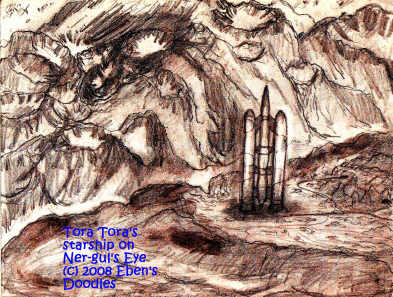
There were, of course, no Atlantean ore shipments now, as the freed slaves no longer worked the orichalc ores, which were the only reason the Atlanteans came to Ner-gul's Eye, or took any interest in Nergalia beyond serving as a blood bank and a pool for armed mercenaries. As his traveling Eyes and Ears had reported, the guards had all fled, fearing retaliation for their cruel treatment of the miners. Taking the last starship docking at Ner-gul's Eye, they abandoned all the inhabitants of the gulags to their fate.
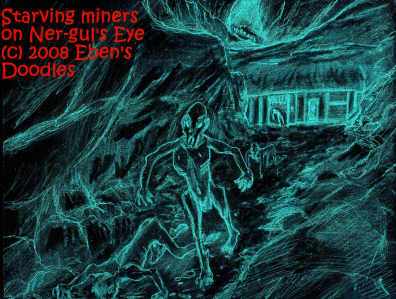
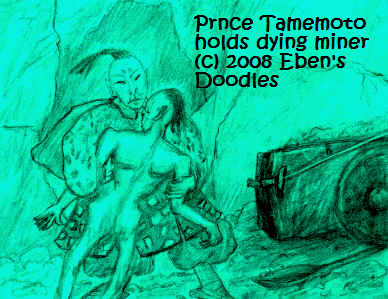
Rising, he continued on. The miners, after being abandoned by their warrior guards and the Atlanteans, had broken into the Atlantean quarters. With the gate's triple doors wide open, pried apart by crowbars and other miner's tools, the prince could walk right in where no Nergulian, warrior or slave, had ever been permitted.
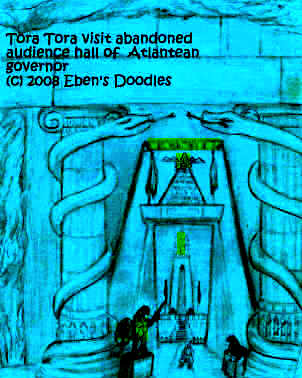
How cold it felt in that forbidden place of the Atlanteans!--as if the life were being squeezed and frozen within him at the same time by a gripping, merciless hand! At the same time he felt as if all his blood were being drawn out of him--sucked! It was no place to linger, and the prince departed without regret.
When the surviving miners had been fed and given all they could safely drink and were resting, the prince convened his disciples. They sat together as they had when he was their sensei back in Hagi in the former days before the Insurrection of the Tojogawas, or the Red Eyebrows Society, as they were now known, as they painted their eyebrows red with the blood of the imperial troops they killed.
Tora Tora spoke to his faithful ones. "There is little time. The enemy will soon be here, to attack us. We must leave at once, and return when we can--if we still are alive and able."
He had only begun to speak, but an unusual thing happened. His disciples had all been glancing at each other while he made his opening remarks, and then one of them-- a blacksmith's son who showed significant promise in poetic writing--rose, bowed very low, and began addressing the sensei.
"Master, allow me to speak for my honorable peers. We are of one mind about this, what I am about to say to you. We have concerns for you, and are agreed on what we desire and want to see come out of this. We know that the people of the shogun only want to slay you, and make a spectacle of you and your bones before all the people of Nergulia in order to shame the face of the exalted Emperor and force him to capitulate to the former shogun. They will take away all our freedom that you, the Emancipator, first revealed to us and the Emperor decreed. We cannot help that our freedom will be taken away soon. But we cannot let you be captured and made a spectacle, a mockery of all you achieved and gave to us so richly. Though we are too few and have only this one starship, and our own swords, to fight back, we can do something if you allow it. If you do not allow it, you will be captured. We do not mind giving our lives for you, but they will not be enough to save you, however many of the enemy we kill. May I go on, Master, are these words reaching your heart?"
The prince nodded, for indeed the words of his disciples, spoken by this disciple, were penetrating him to the very core.
The disciple bowed again, then continued. "What we respectfully plead with you to accept is your departure from Nergulia! It is the only way. We shall be made slaves again, but it will be better for us. We will be slaves on the outside, but not on the inside--for knowing that you are still free will give us hope and cheer for the road ahead. We cannot live at all, we will commit seppuku, if we have not even this hope, which will live in you as long as you carry it within you. Please go at once! Take the starship. We do not need it any longer. We will remain here with the miners and take their lot as our own! The Red Eyebrows will be glad to put us to work here, and not have to kill us. They will want the Atlanteans to return for the orichalc, so if there is no mining and no miners able to do the work, that will not happen. So they will take us as miners and spare our lives."
This was a hard thing for the prince to take, on several counts. Leave Nergulia for good! Abandon his disciples? Flee? Nothing in his warrior's breast, born and bred a Mori warrior and prince, knew what fleeing was! It was always stand and fight to the last breath and the last sword thrust--even in the most hopeless battles. Yet he saw what the disciple was trying to get him to see--that he, their sensei who had become their Emancipator in their own eyes, was their living hope. He was all they had to keep their own hope and their own inner freedom alive in the darkness, the grinding, savage miner's life, and slavery ahead for them.
Tora Tora turned away his face, and took a few paces back and forth as he thought hard on the disciple's telling, deep words of wisdom.


